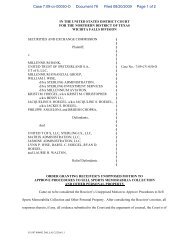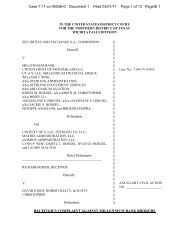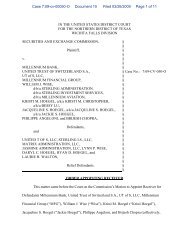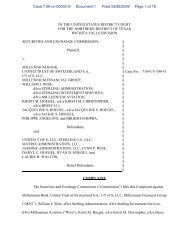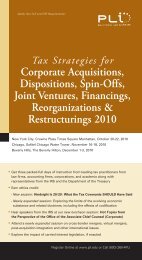View the full text of this document - Martindale.com
View the full text of this document - Martindale.com
View the full text of this document - Martindale.com
Create successful ePaper yourself
Turn your PDF publications into a flip-book with our unique Google optimized e-Paper software.
DIY Approach<br />
Insurance <strong>com</strong>panies may always prefer to be notified immediately about any<br />
potential claims, but in-house counsel have valid reasons to advise on holding <strong>of</strong>f<br />
on a notification in some situations.<br />
“You have to weigh <strong>the</strong> pros and cons,” says Charles George, partner at Patterson,<br />
Dil<strong>the</strong>y, Clay & Bryson, L.L.P. “There may be reasons to handle it yourself.”<br />
The language also tends to be boilerplate—<br />
notice provisions usually call for policyholders<br />
to notify <strong>the</strong> insurance <strong>com</strong>panies “as soon<br />
as practicable.” This is a vague definition<br />
that can allow for disagreements between<br />
policyholders and insurance <strong>com</strong>panies,<br />
with <strong>the</strong> insurance <strong>com</strong>panies <strong>of</strong>ten arguing<br />
that <strong>the</strong>y should have been called in sooner,<br />
no matter when a claim was filed.<br />
Some situations also evolve so slowly it<br />
can be difficult to determine when a<br />
seemingly small glitch be<strong>com</strong>es a matter<br />
for an insurance claim. The scope <strong>of</strong> a<br />
problem may not even be clear to <strong>the</strong><br />
businesspeople who are working closely on<br />
<strong>the</strong> situation. And if it’s not clear to <strong>the</strong>m,<br />
employees may not think about alerting <strong>the</strong><br />
legal department until it is too late.<br />
Variations Abound<br />
Even if a <strong>com</strong>pany files a claim, state policies<br />
vary widely. For instance, under Virginia law,<br />
<strong>the</strong> passage <strong>of</strong> time can be enough to violate<br />
<strong>the</strong> notice provisions—if a <strong>com</strong>pany doesn’t<br />
report an incident immediately, <strong>the</strong> claim<br />
can be denied. But under North Carolina<br />
law, <strong>the</strong>re has to be a showing <strong>of</strong> prejudice<br />
to <strong>the</strong> insurance <strong>com</strong>pany for <strong>the</strong> claim to<br />
be denied, regardless <strong>of</strong> any time delay.<br />
“That’s just one example <strong>of</strong> two different<br />
states interpreting ‘as soon as practicable’<br />
differently,” he says. “From state to state,<br />
one needs to be aware <strong>of</strong> <strong>the</strong> differences.”<br />
George points to a case in Virginia where a<br />
<strong>com</strong>pany waited 126 days to file a claim,<br />
only to have <strong>the</strong> insurance <strong>com</strong>pany deny it.<br />
From a business’ perspective, four months<br />
may not be much time in which to identify<br />
a potential claim and decide whe<strong>the</strong>r to<br />
report it, says George.<br />
The differences between states is fur<strong>the</strong>r<br />
<strong>com</strong>plicated for <strong>com</strong>panies with business<br />
around <strong>the</strong> country. Simply determining<br />
which state’s standards are applicable can be<br />
Good reasons to avoid notifying an insurance <strong>com</strong>pany about a situation that<br />
could evolve into a claim include:<br />
■ Business relationships<br />
Two <strong>com</strong>panies with a good relationship may feel <strong>the</strong>y can settle <strong>the</strong> issue<br />
<strong>the</strong>mselves ra<strong>the</strong>r than bring in <strong>the</strong> insurance <strong>com</strong>panies immediately.<br />
“If you’ve worked with someone for a long time and things are not working out,<br />
<strong>of</strong>tentimes, parties will stick with <strong>the</strong> situation and try to resolve it <strong>the</strong>mselves,”<br />
he says. “Or you may have a situation where you are hoping to keep a good<br />
customer happy.”<br />
■ Differing interests<br />
Insurance <strong>com</strong>panies and <strong>the</strong>ir policyholders don’t necessarily share <strong>com</strong>mon<br />
interests and goals. Insurance <strong>com</strong>panies report to <strong>the</strong>ir own stakeholders, and<br />
<strong>the</strong>y are most interested in resolving disputes for <strong>the</strong> lowest cost possible,<br />
according to George. A policyholder, on <strong>the</strong> o<strong>the</strong>r hand, may be far more<br />
interested in retaining a business relationship—something that doesn’t worry<br />
<strong>the</strong> insurance <strong>com</strong>pany.<br />
■ Rising costs for claims<br />
The more incidents a <strong>com</strong>pany reports, <strong>the</strong> more likely it is to see insurance rates<br />
increase. Some corporate situations are <strong>the</strong> equivalent <strong>of</strong> a fender-bender that<br />
doesn’t require bringing in <strong>the</strong> insurance <strong>com</strong>pany. “If you rear-end someone and<br />
you may be able to fix it for $100, you wouldn’t necessarily call <strong>the</strong> insurance<br />
<strong>com</strong>pany,” George points out. If you can convince <strong>the</strong> o<strong>the</strong>r party to send you <strong>the</strong><br />
bill from <strong>the</strong> body shop, you’ve saved yourself rising rates and a lot <strong>of</strong> paperwork.<br />
a time-consuming process. George points to<br />
ano<strong>the</strong>r client that was headquartered in<br />
Georgia, had purchased insurance in North<br />
Carolina and <strong>the</strong>n had a claim in Tennessee.<br />
Determining which state’s rules to follow<br />
took some time to figure out.<br />
The key to determining whe<strong>the</strong>r to call<br />
in <strong>the</strong> insurance <strong>com</strong>pany <strong>of</strong>ten hinges on<br />
specific notice provisions and <strong>the</strong> laws in<br />
individual states. When deciding whe<strong>the</strong>r a<br />
situation warrants involving an insurance<br />
<strong>com</strong>pany, in-house counsel must understand<br />
<strong>the</strong> ramifications <strong>of</strong> what could happen if<br />
<strong>the</strong>y do, and what could happen if <strong>the</strong>y<br />
don’t. “Consider whe<strong>the</strong>r <strong>the</strong> insurance<br />
might apply, and <strong>the</strong> pros and cons to your<br />
organization in reporting it to your insurer.<br />
When in doubt, give notice to <strong>the</strong><br />
insurance <strong>com</strong>pany,” George advises.<br />
Patterson, Dil<strong>the</strong>y, Clay & Bryson, L.L.P. is a<br />
firm <strong>com</strong>prised exclusively <strong>of</strong> trial lawyers<br />
who are actively engaged in <strong>the</strong> defense<br />
<strong>of</strong> civil litigation throughout North Carolina.<br />
The firm’s attorneys concentrate <strong>the</strong>ir<br />
practice in <strong>the</strong> defense <strong>of</strong> products liability,<br />
premises liability, extra-contractual litigation,<br />
medical malpractice, workers’ <strong>com</strong>pensation,<br />
insurance coverage, automobile liability and<br />
o<strong>the</strong>r civil defense litigation.<br />
Article Participant:<br />
Charles George<br />
Partner<br />
cgeorge@pattersondil<strong>the</strong>y.<strong>com</strong><br />
JULY 2007<br />
29



